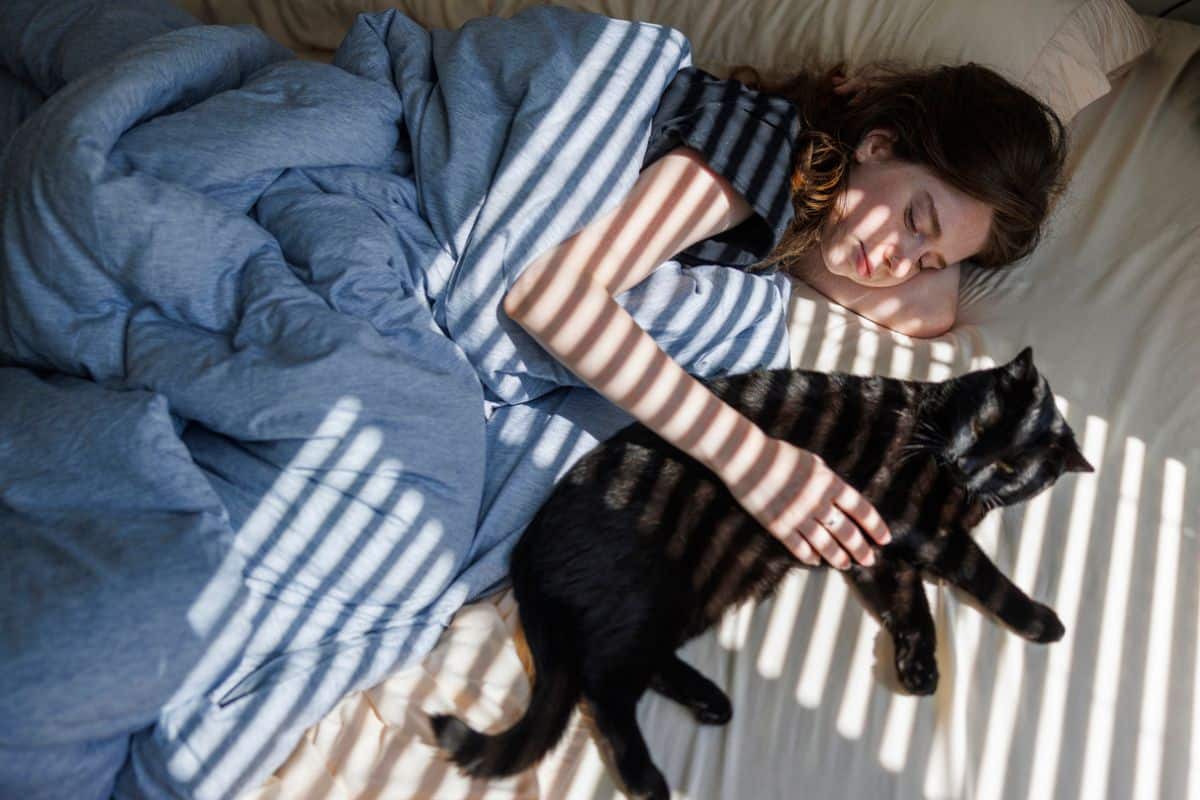
Check out our latest products
Recent studies in feline behavior continue to fascinate pet owners worldwide. Scientists have discovered that cats sleeping habits reveal deep emotional bonds with their human companions. Understanding these nocturnal behaviors strengthens the human-animal connection and improves pet welfare.
Many cat owners wake up to find their feline friend curled up beside them, wondering what drives this endearing behavior. While some might assume cats simply seek convenience, the reality involves complex emotional and instinctual factors. Three key reasons explain why cats choose to sleep alongside their beloved humans, revealing fascinating insights into feline psychology and the special bond between cats and their owners.
Seeking warmth and comfort through human body heat
Cats possess an innate drive to find warm sleeping spots, making human beds particularly appealing during cooler months. Despite their thick fur coats, felines naturally gravitate toward heat sources to maintain optimal body temperature while resting. Your body generates consistent warmth throughout the night, creating an ideal microenvironment for your cat’s comfort.
This behavior stems from evolutionary survival instincts, where wild cats conserved energy by seeking sheltered, warm locations. Domestic cats retain these instincts, explaining why they often choose sunny windowsills during the day and cozy radiator spots in winter. When nighttime temperatures drop, your presence becomes the most reliable heat source available.
The opportunistic nature of cats becomes evident when observing their daily routines. They instinctively position themselves near heating vents, electronics, or sunny patches throughout the house. This same logic applies to their nighttime choices : your bed offers consistent warmth combined with the familiar scent and presence of their trusted companion. The thermal comfort you provide creates positive associations that encourage repeated behavior.
Creating a secure environment through trust and protection
When cats choose to sleep on or near their owners, they demonstrate profound trust and vulnerability. Sleep represents the most defenseless state for any animal, requiring complete confidence in their surroundings. By positioning themselves on your chest or beside your body, cats signal their belief that you pose no threat to their safety.
This behavior reflects the deep security cats feel in your presence, contradicting the common misconception that all cats remain independent and aloof. Cats typically maintain awareness of their environment, ready to respond to potential dangers. When they surrender this vigilance to sleep peacefully against you, it indicates exceptional trust in your protective capabilities.
The vulnerable positioning also serves a practical purpose : your movements and breathing patterns provide subtle alerts to environmental changes. Cats can detect shifts in your sleep patterns that might indicate external disturbances, allowing them to remain relaxed while maintaining indirect awareness. This partnership creates mutual benefits, as your cat’s presence can also alert you to unusual household sounds or activities.
Expressing genuine affection and strengthening bonds
Physical closeness during sleep represents one of the strongest expressions of feline affection, often accompanied by purring, kneading, and gentle headbutting. These behaviors typically precede the sleeping ritual, indicating your cat’s desire to share intimate space and demonstrate emotional connection. Not all cats exhibit such affectionate tendencies, making this behavior particularly meaningful.
The bonding aspect becomes especially apparent when cats seek out specific family members for nighttime companionship. They may ignore other household members while consistently choosing one person’s bed, indicating selective attachment and preference. This choice reflects the strength of your relationship and the cat’s recognition of you as their primary source of comfort and security.
Some cats extend their trust by exposing their bellies or allowing gentle touching during these intimate moments. This level of vulnerability represents the highest form of feline trust, as the abdomen contains vital organs that cats instinctively protect. When your cat offers belly access while settling in for sleep, they’re communicating complete confidence in your benevolent intentions.
Managing nighttime companionship for better rest
While sharing your bed with a cat creates wonderful bonding opportunities, practical considerations may require establishing boundaries. Cats maintain nocturnal instincts that can disrupt human sleep patterns, including midnight play sessions, early morning demands for attention, or restless movement throughout the night.
Health considerations include maintaining proper parasite prevention, regular vaccinations, and paw cleanliness, especially for outdoor cats. People with allergies should carefully weigh the benefits against potential respiratory issues caused by dander and fur in sleeping areas. Creating comfortable alternatives near your bed can satisfy your cat’s desire for proximity while preserving sleep quality.
Consider providing dedicated cat beds, heated blankets, or cozy perches positioned strategically around your bedroom. This approach allows your feline companion to remain close while giving you space for uninterrupted rest. Most cats adapt quickly to new arrangements when their basic needs for warmth, security, and companionship remain fulfilled through alternative solutions.



![[PETHROOM] Cat Nail Clipper Trimmer for Indoor Cats with Circular Cut Hole (2mm) | Premium Sturdy Stainless Steel Blade Cat Claw | Safe, Easy, Accurate, Quiet & Fast | Avoid Overcutting](https://m.media-amazon.com/images/I/6156hi88deL._AC_SL1298_.jpg)
![[PETHROOM] Professional Eye Comb for Pets | Stainless Steel Tear Stain Remover for Cats & Dogs | Gentle Round-Head Grooming Tool | Compact & Portable for Eye Gunk Removal](https://m.media-amazon.com/images/I/71+W758uwXL._SL1500_.jpg)









